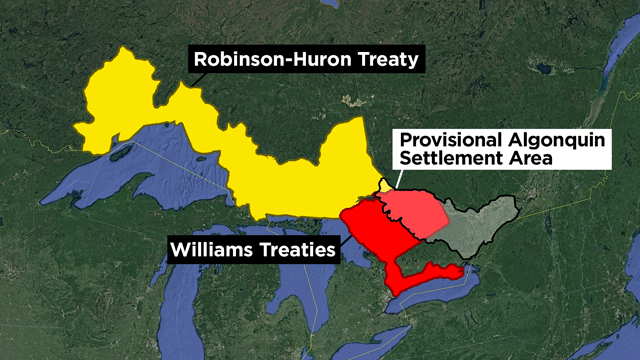The chief of Batchewana Bay First Nation is calling on Ontario and Canada to stop negotiating with other First Nations organizations whose land claims infringe on Robinson Huron Treaty territory.
Dean Sayers is in Ottawa for a Chiefs of Ontario special assembly, where he spoke with APTN News about his organization’s concerns with how land claims are proceeding in Ontario.
As the spokesperson for the Robinson Huron Waawiindaamaagewin (RHW), Sayers spoke on behalf of 21 Anishinaabe First Nations that signed the Robinson Huron Treaty in 1850.
The First Nations are located on the northeastern shores of Lake Huron, eastern Lake Superior, and Manitoulin Island.
The group also asserted water rights to lakes Huron, Superior and Nipissing, and asked the government to settle a case regarding treaty annuities.
Sayers said colonial governments have overstepped their jurisdiction and that, as signatories to a treaty that pre-dates Confederation, consent from the Robinson Huron First Nations is required for any land claim impacting their territory.
“We have underlying title to the land, and it’s reserved in our treaty relationship with Crown representatives. What that means to us is that Canada has asserted that they have, without question, jurisdiction to deal with land and resources, but that’s not the case,” he said.
“They have to engage us and they need our permission, even if we do find out after the fact. There’s been no discussions with us even though they know full well, legally they have a limited license to be able to have the types of discussions they’re engaging in with a lot of organizations.”
Sayers was referring to a number of historical treaties and ongoing discussions between First Nations and Métis organizations with the provincial and federal governments.
The Williams Treaties were signed in 1923 between seven Anishinaabe First Nations and representatives of the Crown, covering land east of Georgian Bay on Lake Huron.
In 2016, the Algonquins of Ontario ratified an agreement in principle for a 36,000 square kilometres land claim.
The territory includes Ottawa and stretches south toward Kingston and west to North Bay.
All three treaties overlap in the area of Lake Nipissing and North Bay. There is significant overlap between the Williams and Algonquins of Ontario treaties in this area.
Robert Potts, lead negotiator for the Algonquins of Ontario, said his organization is looking forward to meeting with the Robinson First Nations to work out boundary disputes.
“We’re working on getting meetings organized with respect to these issues,” said Potts. “I have no doubt we’ll come up with amicable solutions. We have tremendous respect for the chiefs and their people, and I know they do with us. So it’s just a matter of time and energy, that’s really what it takes.”

Indigenous Nation to Nation Relationships
Sayers expressed a similar sentiment. He said he doesn’t want to create conflict with neighbouring organizations.
He said he also wants to see a strengthening of Indigenous nation to nation relationships that leads to a collective assertion of inherent rights.
“Let’s sit down again. Let’s talk about these things. Let’s start with ceremony. Let’s work through these issues in a diplomatic way and leave Canada and Ontario out of the room,” he said.
“Colonial concepts conflict with our Indigenous worldviews and our Indigenous concepts around governance. It deflates how we can and should be working together,” he added.
“We’re trying to leave the colonial concepts at the door when we get together, but it is an inviting door. We do recognize everybody’s interests come from a different lens. We try to recognize that in the work we’re proposing to do.”
The Métis Nation of Ontario signed a self-government agreement with the federal government last year, along with other provincial branches of the Métis Nation.
The Robinson group said it does not recognize the Métis in their territory as having any land rights.
But Sayers said this doesn’t mean the door is shut. He again stressed that as title holders, the First Nations, not the government, have jurisdiction over use of treaty land.
“The Crown, through whatever mechanism, has determined that they can give land away to who they want when they’re only surface users. They’re not underlying title holders. You can’t give away something that you don’t own,” said Sayers.
“Métis are welcome to come and talk to us about how they would like to use the land and how they would like to use the resources. Those are inherent jurisdictions that we as original peoples of those lands have. They’re not rights that were born in 1867.”
APTN reached to the Métis Nation of Ontario but did not get a response by the time of publication.
Gillian Hanson, a spokesperson for minister of Indigenous-Crown Relations Carolyn Bennett, did not say whether the government plans to meet with the Robinson Huron signatories.
“We are working with Indigenous governments to resolve historical wrongs and develop ways to advance reconciliation,” she said in an email.










